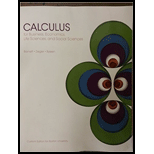DPT Diagnostic Prerequisite Test 1 Functions And Graphs 2 Limits And The Derivative 3 Additional Derivative Topics 4 Graphing And Optimization 5 Integration 6 Additional Integration Topics 7 Multivariable Calculus 8 Trigonometric Functions 9 Differential Equations 10 Taylor Polynomial And Infinite Series 11 Probability And Calculus A.1 Real Numbers A.2 Operations On Polynomials A.3 Factoring Polynomials A.4 Operations On Rational Expressions A.5 Integer Exponents And Scientific Notation A.6 Rational Exponents And Radicals A.7 Quadratic Equations B.1 Sequences, Series, And Summation Notation B.2 Arithmetic And Geometric Sequences B.3 Binomial Theorem B.4 Interpolating Polynomials And Divided Differences expand_more
7.1 Functions Of Several Variables 7.2 Partial Derivatives 7.3 Maxima And Minima 7.4 Maxima And Minima Using Lagrange Multipliers 7.5 Method Of Least Squares 7.6 Double Integrals Over Rectangular Regions 7.7 Double Integrals Over More General Regions Chapter Questions expand_more
Problem 1MP: Matched Problem 1 Evaluate (A)(4xy+12x2y3)dy (B)(4xy+12x2y3)dx Problem 2MP: Matched Problem 2 Evaluate (A) 01(4xy+12x2y3)dy (B) 03(4xy+12x2y3)dx Problem 3MP: Matched Problem 3 Evaluate (A)03[01(4xy+12x2y3)dy]dx (B)01[03(4xy+12x2y3)dx]dy Problem 4MP: Matched Problem 4 Evaluate R(2xy)dAoverR=(x,y)1x5,2y4 both ways. Problem 5MP: Matched Problem 5 Evaluate Rxy2ex/ydAoverR=(x,y)0x1,1y2. Problem 6MP: Matched Problem 6 Find the average value of f(x, y) = x + 2y over the rectangle R = {(x, y) | 0 x ... Problem 7MP: Matched Problem 7 Find the volume of the solid that is under the graph of f(x,y)=1+x+y and over the... Problem 1ED: Explore and Discuss 1 (A) Which of the functions f(x, y) = 4 x2 y2 and g(x, y) = 4 x y would you... Problem 1E: Skills Warm-up Exercises In Problems 16, find each antiderivative. (If necessary, Sections 5.1 and... Problem 2E: Skills Warm-up Exercises In Problems 16, find each antiderivative. (If necessary, Sections 5.1 and... Problem 3E: Skills Warm-up Exercises In Problems 16, find each antiderivative. (If necessary, review Sections... Problem 4E Problem 5E Problem 6E Problem 7E: A In Problems 716, find each antiderivative. Then use the antiderivative to evaluate the definite... Problem 8E Problem 9E: A In Problems 716, find each antiderivative. Then use the antiderivative to evaluate the definite... Problem 10E Problem 11E: A In Problems 716, find each antiderivative. Then use the antiderivative to evaluate the definite... Problem 12E: A In Problems 716, find each antiderivative. Then use the antiderivative to evaluate the definite... Problem 13E: A In Problems 716, find each antiderivative. Then use the antiderivative to evaluate the definite... Problem 14E: A In Problems 716, find each antiderivative. Then use the antiderivative to evaluate the definite... Problem 15E Problem 16E Problem 17E: B In Problems 17-26, evaluate each iterated integral. (See the indicated problem for the evaluation... Problem 18E: B In Problems 17-26, evaluate each iterated integral. (See the indicated problem for the evaluation... Problem 19E: B In Problems 17-26, evaluate each iterated integral. (See the indicated problem for the evaluation... Problem 20E: B In Problems 17-26, evaluate each iterated integral. (See the indicated problem for the evaluation... Problem 21E: B In Problems 17-26, evaluate each iterated integral. (See the indicated problem for the evaluation... Problem 22E: B In Problems 17-26, evaluate each iterated integral. (See the indicated problem for the evaluation... Problem 23E: B In Problems 17-26, evaluate each iterated integral. (See the indicated problem for the evaluation... Problem 24E: B In Problems 17-26, evaluate each iterated integral. (See the indicated problem for the evaluation... Problem 25E Problem 26E Problem 27E: Use both orders of iteration to evaluate each double integral Problems 2730. 27.... Problem 28E Problem 29E Problem 30E: Use both orders of iteration to evaluate each double integral Problems 2730. 30.... Problem 31E: In Problems 3134, find the average value of each function over the given rectangle. 31.... Problem 32E Problem 33E: In Problems 3134, find the average value of each function over the given rectangle. 33.... Problem 34E: In Problems 3134, find the average value of each function over the given rectangle. 34.... Problem 35E: In Problems 3538, find the volume of the solid under the graph of each function over the given... Problem 36E: In Problems 3538, find the volume of the solid under the graph of each function over the given... Problem 37E: In Problems 3538, find the volume of the solid under the graph of each function over the given... Problem 38E Problem 39E: C Evaluate each double integral in Problems 3942. Select the order of integration carefully; each... Problem 40E: C Evaluate each double integral in Problems 3942. Select the order of integration carefully; each... Problem 41E Problem 42E: C Evaluate each double integral in Problems 3942. Select the order of integration carefully; each... Problem 43E: Show that 0202(1y)dxdy=0 . Does the double integral represent the volume of a solid? Explain. Problem 44E Problem 45E: Let f(x, y) = x3 + y2 ex 1. (A) Find the average value of f(x, y) over the rectangle... Problem 46E Problem 47E: Multiplier principle. Suppose that Congress enacts a one-time-only 10% tax rebate that is expected... Problem 48E Problem 49E Problem 50E Problem 51E: Population distribution. In order to study the population distribution of a certain species of... Problem 52E: Population distribution. Repeat Problem 51 for a square habitat that measures 12 feet on each side,... Problem 53E Problem 54E Problem 55E: Safety research. Under ideal conditions, if a person driving a car slams on the brakes and skids to... Problem 56E Problem 57E Problem 58E format_list_bulleted


 Discrete Mathematics and Its Applications ( 8th I...MathISBN:9781259676512Author:Kenneth H RosenPublisher:McGraw-Hill Education
Discrete Mathematics and Its Applications ( 8th I...MathISBN:9781259676512Author:Kenneth H RosenPublisher:McGraw-Hill Education Mathematics for Elementary Teachers with Activiti...MathISBN:9780134392790Author:Beckmann, SybillaPublisher:PEARSON
Mathematics for Elementary Teachers with Activiti...MathISBN:9780134392790Author:Beckmann, SybillaPublisher:PEARSON
 Thinking Mathematically (7th Edition)MathISBN:9780134683713Author:Robert F. BlitzerPublisher:PEARSON
Thinking Mathematically (7th Edition)MathISBN:9780134683713Author:Robert F. BlitzerPublisher:PEARSON Discrete Mathematics With ApplicationsMathISBN:9781337694193Author:EPP, Susanna S.Publisher:Cengage Learning,
Discrete Mathematics With ApplicationsMathISBN:9781337694193Author:EPP, Susanna S.Publisher:Cengage Learning, Pathways To Math Literacy (looseleaf)MathISBN:9781259985607Author:David Sobecki Professor, Brian A. MercerPublisher:McGraw-Hill Education
Pathways To Math Literacy (looseleaf)MathISBN:9781259985607Author:David Sobecki Professor, Brian A. MercerPublisher:McGraw-Hill Education




